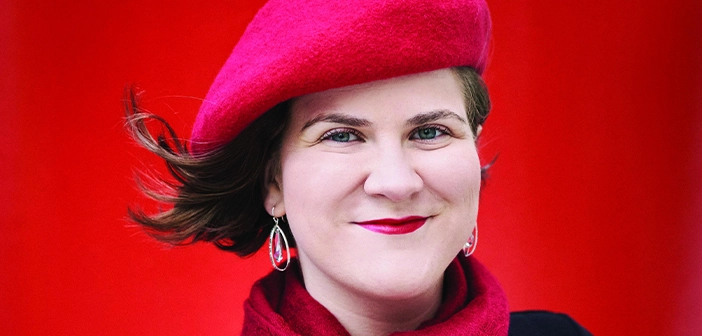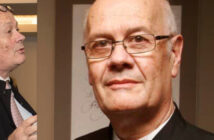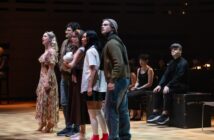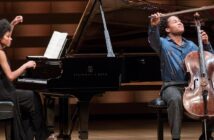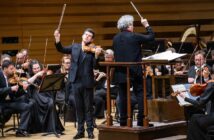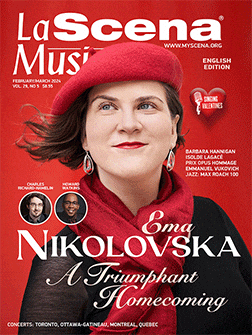
This page is also available in / Cette page est également disponible en:
![]() Francais (French)
Francais (French)
When Ema Nikolovska packed her bags to move across the Atlantic eight years ago, she was known in Toronto’s musical community as a violinist. This year, she returns to Canada for a series of major performances—not as a violinist, but as one of the rising stars of the opera and voice world.
Nikolovska was born in Skopje, Macedonia, and emigrated to Canada at a young age, growing up in Toronto. She began violin lessons at the Royal Conservatory of Music (RCM) when she was four years old, and continued studying there for the remainder of her substantial violin education. She ultimately graduated with her bachelor of music from The Glenn Gould School in 2015.
Throughout her violin education, Nikolovska’s interest in singing was quietly brewing beneath the surface. It all began when she joined the Toronto Children’s Chorus at the age of 10. “That was my first introduction to using my voice and I loved it,” she recalls. When she was 16, Nikolovska met singing teacher Helga Tucker through a chance encounter at a voice recital, and decided to take some lessons with her for fun. She was immediately taken with the vast breadth of repertoire available to singers, and the expressive possibility of music that utilized text.
The most pivotal discovery during her studies with Tucker at The Royal Conservatory’s Taylor Academy extended beyond repertoire, though. As a violinist, Nikolovska’s desire to get things right and her industrious disposition, self-described as “very, very serious, always (with) a furrowed brow,” had taken her far. Tucker challenged this work-harder-not-smarter attitude, emphasizing that pleasure and joy were integral to strong vocal technique.
A crucial difference between voice and violin training began unveiling itself to Nikolovska. “With voice, I realized that my wilfulness, and desire to be in tune and correct would not help me sing well,” she says. “Helga was the person who helped me realize the direct link between my psychology and singing. If I am cruel to myself and negative, I will not be able to sing. It was a huge growth process. It was like therapy.”
By the time she finished her degree at The Glenn Gould School, Nikolovska had fallen in love with the meditative, holistic aspect of singing, and her interest in voice had become too strong to ignore. “I never thought that I’d be a singer,” she says. “I never knew I could be one. I just had this hypothesis at the end of my undergrad that I’d be happier singing full-time.” She decided to test out that hypothesis by pursuing a graduate degree in voice.
Nikolovska completed four years of study at the Guildhall School of Music and Drama in London as a mezzo-soprano, and capped off her education with a streak of impressive accomplishments, including an appointment as a BBC New Generation Artist, and wins at major singing competitions such as the International Vocal Competition in ’s-Hertogenbosch, and the Kathleen Ferrier Awards.
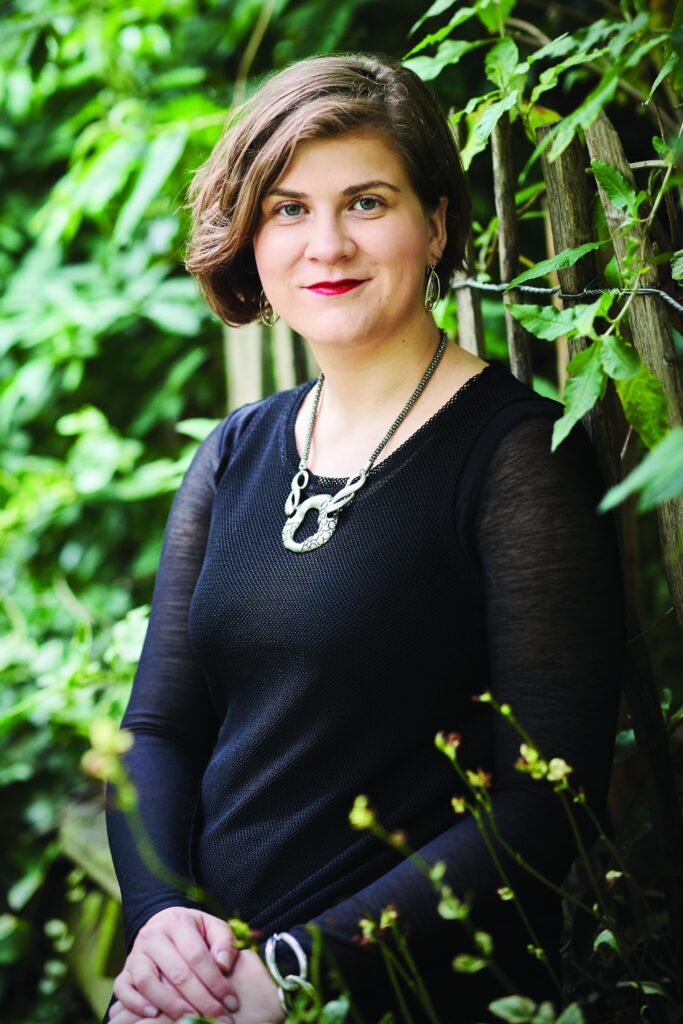
Ema Nikolovska (Photo by Kaupo Kikkas)
“I felt like I was always behind, because I didn’t know very much about vocal repertoire. I had a lot of catching up to do when I got to my master’s.” Rather than letting that beginner’s discomfort slow her down, she let her voracious appetite for vocal music and her can-do violinist’s attitude guide her through the early years of her career change. She set to work learning all the repertoire she could get her hands on and applying for every performance opportunity and singing competition she could find. “My objective was to perform more, to get comfortable with this voice, to get comfortable with myself. In my mind, because as a violinist I was performing so much—as a violinist, you’re thrown into situations where you’re learning new music all the time and performing all the time—I thought: Well, what if I apply that logic to voice?” Her efforts paid dividends.
Following her time in London, Nikolovska joined the prestigious International Opera Studio at the Berlin Staatsoper in 2020, and made opera and recital debuts across Europe in venues like the Royal Opera House, Pierre Boulez Saal and Wigmore Hall. Since making Berlin her home, she has hoped to return to Canada, so that she can introduce her new instrument—her voice—to the community that raised her. The stars aligned this season for such a homecoming to take place, and her schedule booked up with four straight months of North American engagements in venues stretching from coast to coast.
First up is her house and role debut as the Fox in Janáček’s The Cunning Little Vixen running at the Canadian Opera Company (COC) from Jan. 26 to Feb. 16. This production represents a true full-circle moment for Nikolovska. Exactly 10 years ago, in what she describes as “one of the most fulfilling musical experiences of my life,” she played first violin in a production of Vixen at The Glenn Gould School. Sitting in the orchestra pit, with minimal experience with 20th-century repertoire, she felt overwhelmed by the challenges of Janáček’s frequent metric changes and bold musical palette. “At first, because I was still really green—I must’ve been 20 at that point—I was ignorant about Janáček’s music. I didn’t understand it, and I was a bit resistant.”
As she got to know the score, however, Nikolovska was enamoured of Janáček’s unique, folk-inspired soundscape and her entire philosophy on musical taste was transformed. “After about a week or two of orchestra rehearsals, I thought: This is the best music in the world! That experience illustrated to me the importance of committing to projects, esthetics, and music that you don’t necessarily respond to immediately: it could take you a week or two weeks, and then you fall in love,” she says.
This time around, Vixen is broadening her horizons in new ways. The role of the Fox sits high in a mezzo-soprano’s range and features tricky melodic lines, shaped to match the contours of the Czech language. Ten years on from her introduction to this opera, Nikolovska is approaching Janáček’s idiosyncrasies with an intimate knowledge and appreciation of this music, and she’s having plenty of fun along the way.
One of her favourite elements of the COC’s production is its distinctive approach to the romance between her character and the opera’s titular Vixen, achieved through androgynous costuming and staging. “It’s not so much about the gender of the animals, or me seeming male,” Nikolovska says. “It’s more about what they’re both bringing to the interaction in terms of their past histories and where they’re at in their lives at that point. I think that’s interesting because, in male-female dynamics in operas, we don’t always have something that’s a bit more ambiguous.” While the animals in Vixen serve as a vehicle to thoughtfully examine human relationships, they are also a source of parodic humour. “This scene is very serious and very charming, but also I find it really, really silly! It’s really childlike, but also really adult.”
After concluding her performances at the COC, Nikolovska will embark on a recital tour across Canada and the United States, at venues including the Vancouver Recital Society on March 17, Bourgie Hall in Montreal on March 20, Koerner Hall in Toronto on March 24, Carnegie Hall in New York City on March 28, and the Ottawa Chamberfest on April 2. Seizing a rare opportunity to collaborate with North America-based pianists, she will share the stage with Howard Watkins in the American cities and with Charles-Richard Hamelin (whom she first met when the two were teenagers at the Orford Music Academy) in Canada.
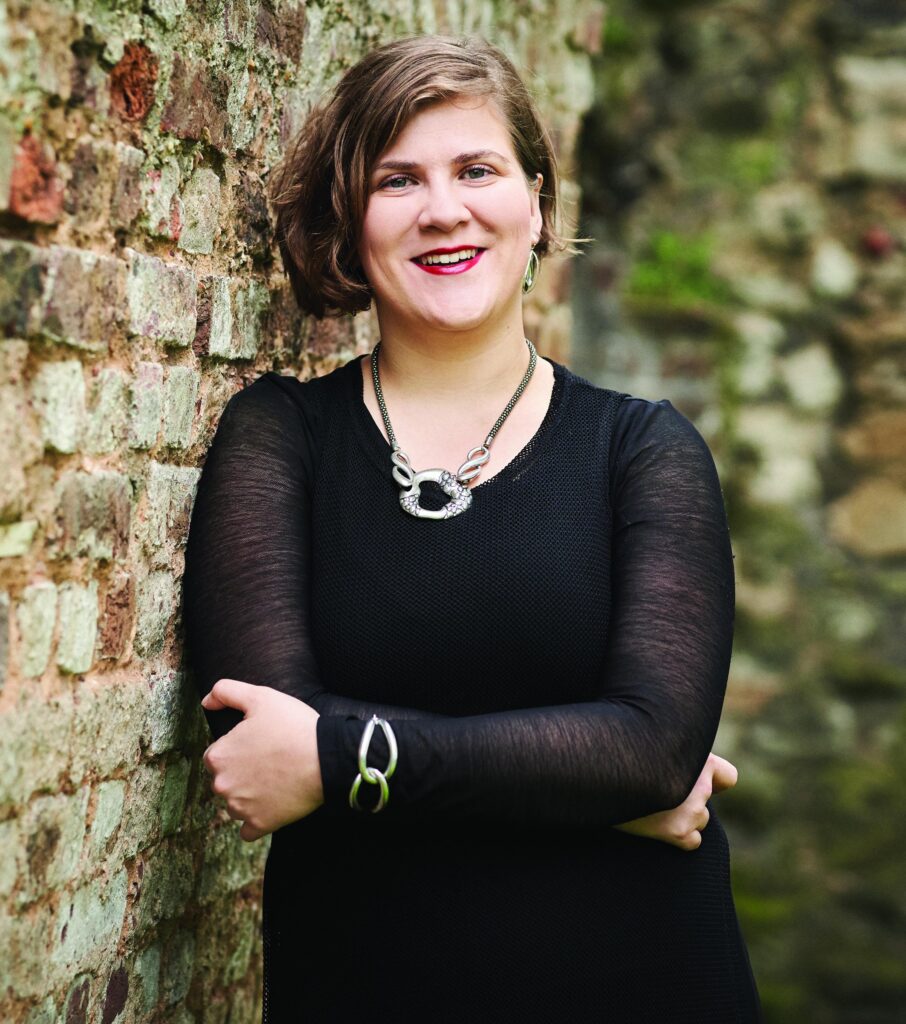
Ema Nikolovska (Photo by Kaupo Kikkas)
Nikolovska’s passion for recital programming, a skill for which she has become well-known, is apparent as soon as she begins to discuss her upcoming tour. She credits her father, an IT worker and amateur violinist, as her first instructor in musical curiosity and curation. The mix tapes he would create for family road trips, containing everything from Balkan folk music to heavy metal, served as a masterclass in programming, showcasing the transformative power of juxtaposition and context in altering a listener’s experience of a piece of music.
Thanks to her father’s influence, Nikolovska has maintained a diverse listening diet ever since childhood; her 2023 Spotify Wrapped ran the gamut from Janelle Monáe to Richard Strauss to Stromae. She firmly believes in constantly researching new repertoire, ensuring that she has an abundance of musical ingredients on hand to craft programs that unfold like flavourful, multicourse meals.
She spent hours carefully devising the program that she will soon perform across North America. “I wanted to keep it relatively standard,” she says, “because the audiences here don’t really know me. I wanted to build some trust. If I give you my craziest program right now, how will you be open to receiving it if you’ve never met me? It’s like when you meet a person for the first time!” Compared to upcoming recitals that she has booked in Europe, which will feature world premières, electronics, and Bob Dylan, this program is relatively tame, although it does contain its fair share of the vocal repertoire’s hidden gems.
The first half, loosely themed around the four seasons, features works by Schubert, Tchaikovsky, and Margaret Bonds. The second half includes Debussy’s beloved Ariettes oubliées, as well as works by Medtner and Nicolas Slonimsky, and is subtly knit together by the contrasting themes of nature and urbanity.
Ever-aware of the power of context, Nikolovska was mindful of how she positioned popular and lesser-known works within the program. “If I want to prime the audience into a state where they will be able to open themselves to (unfamiliar) music, what kind of context can I give that music?” she asked herself. Conversely, “How can we challenge people to experience sound worlds that they think are familiar to them, but in a new light?” In answering these questions, she landed on a lineup of music that she cheekily refers to as “a very thoughtful potpourri of things—a thoughtful tapas.”
The final engagement on Nikolovska’s whirlwind homecoming schedule is three performances of Stravinsky’s rarely-heard ballet-canata Les noces with the Orchestre symphonique de Montréal on April 10, 11, and 12. Like her feelings toward Janáček, Nikolovska’s admiration for Stravinsky began in her violinist days, playing in the first violin section of The Rite of Spring at The Glenn Gould School. She looks forward to performing his work again, this time as a singer.
Nikolovska’s appearance with the OSM will mark the last in a series of debuts she will be making across the continent over the next few months. “It’s really special to be embraced within the realms of opera, and song, and concert—(and) it’s all happening within a few months!”
While each debut will be exciting in its own way, she admits that performing to her hometown crowd in Koerner Hall for the first time as a mezzo-soprano, after so many years of performances there with a violin in hand, will be an especially meaningful experience. “Singing that recital is a way for me to thank all the people who raised me here. Anyone at the RCM, not just the professors. Everyone who was in that building, who was kind to me, showed me love, made me feel welcome, and made me feel excited about music. Everyone in that building changed my life.”
Nikolovska will perform
- March 17, 2024: Vancouver Recital Society, Recital
- March 20, 2024: Montreal Museum of Fine Arts (Bourgie Hall), Recital
- March 24, 2024: Royal Conservatory of Music (Koerner Hall), Recital
- April 2, 2024: Ottawa Chamberfest, Recital
- April 10, 11, & 12, 2024: Montreal Symphony Orchestra, Les Noces
- April 14, 2024: University of Western Ontario, Recital
For more information: rcmusic.com/Concerts, www.mbam.qc.ca, www.osm.ca, www.chamberfest.com
Playlist
This page is also available in / Cette page est également disponible en:
![]() Francais (French)
Francais (French)

